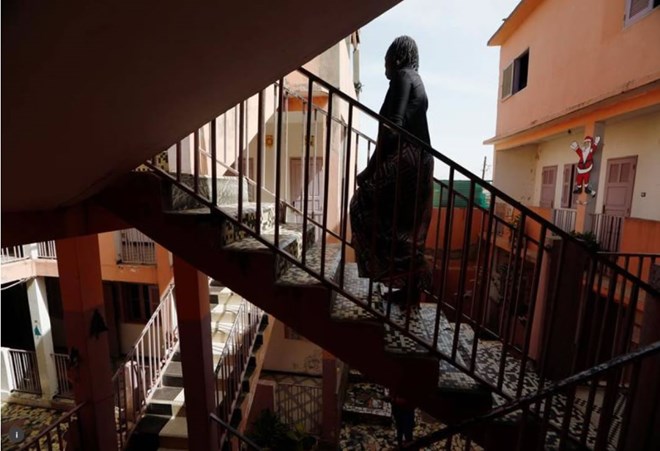
Thursday October 15, 2020
By Nita Bhalla

A woman, 24, who said she was raped twice, walks up the stairs at La Maison Rose, a shelter for women and girls who have fled abuse, rape, forced marriage and other trauma in Dakar, Senegal January 7, 2020. Picture taken January 7, 2020. REUTERS/Zohra Bensemra
NAIROBI, Oct 15 (Thomson Reuters Foundation) - More than 70% of displaced and refugee women in Africa have seen a rise in domestic violence in their communities during the coronavirus pandemic, a survey published on Thursday found.
More than half the 850 women interviewed in 15 African nations also reported a rise in sexual violence and almost one in three had observed a growth in early and forced marriage, said the International Rescue Committee (IRC).
Lockdowns to curb the spread of COVID-19 have fuelled an upsurge in gender-based violence (GBV) across the world, with victims forced to spend more time with their abusers and prevented from seeking safety elsewhere.
Social and economic strains compounded by strict limits on movement have also made women and girls more vulnerable to sexual exploitation, say women's rights charities.
But the IRC said funding to protect the millions of refugee and displaced women and girls - who are among the world's most vulnerable - remained inadequate.
"Despite the early warnings that predicted increased violence and the lessons learned during the Ebola crisis, the international community continues to treat GBV as an after-thought," said Nicole Behnam, IRC's senior director for violence prevention.
The study, which is funded by Irish Aid, surveyed women in countries including the Democratic Republic of Congo, Cameroon, Chad, Nigeria, Sierra Leone, Ethiopia, Kenya, Somalia, South Sudan and Uganda.
It found that economic hardship caused by the pandemic had also heightened women and girls' exposure to violence and exploitation outside their homes.
Respondents spoke of landlords threatening eviction and abusing female tenants and women and girls forced to venture outside camps to sell firewood and being sexually exploited in exchange for food and sanitary pads.
Increased household demand for water meant women and girls were spending longer at water points, where they were subjected to sexual violence, the report said.
This included harassment and violence by military and police officials, especially when violating curfew, as longer queues and increased need forced some women and girls to walk long distances, it said.
Social distancing requirements meant they could not use traditional safety measures such as walking in groups.
School closures had detrimental effects on the safety of girls, leading to increases in child marriage, adolescent pregnancies and sexual exploitation and abuse, respondents said.
United Nations Secretary General Antonio Guterres has repeatedly called on countries to take action against the "horrifying increase in violence against women and girls" during the COVID-19 pandemic.
The IRC said international donors have failed to provide the funds to support those who are most at risk, such as women and girls who have been forced to flee their homes due to conflict or disaster and are living in a foreign place.
The United Nations has appealed for more than $10 billion to support vulnerable communities across the world deal with the fallout of the pandemic. But it has only raised around 30%, according to its Financial Tracking Service.
"The time for excuses has long passed and rhetoric needs to be matched with meaningful action and adequate funding," said Behnam in a statement.